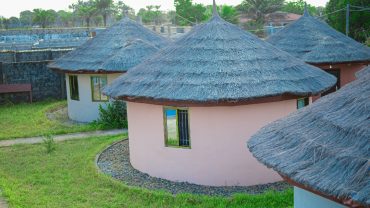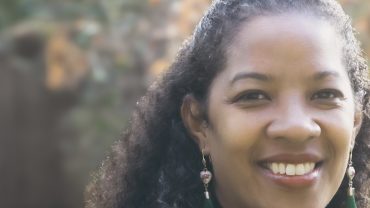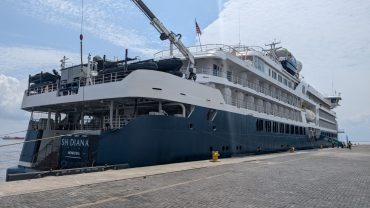Abimbola Carrol is a young Sierra Leonean entrepreneur full of energy and zest; determined to succeed in whatever he does. That came out strongly when I listened to him on the phone from London where he was recently on a brief visit. I could tell he meant business and that he was ready to do whatever it took to prove that Sierra Leoneans can succeed in business.
Abimbola (Bimbola for short) told me he left a 9-5 job in London in 2004 (two years after the end of the war) to start his tourism business which he simply baptized “Visit Sierra Leone” (www.visitsierraleone.org). That message convinced me (I am normally not easy to convince, but the vibes coming from him were very positive). I knew he will go very far because being a risk-taker is the mark of the true businessman. I know, because I am also a kind of businessman, a publisher. How many Sierra Leoneans would leave a comparatively comfortable job in the West to return to poor Sierra Leone to start a business? Not many, I can assure you. He believes it is very vital to have Sierra Leoneans return home saying “I know not everyone can leave their lives and return home at this moment and this isn’t always an economically driven decision. But we have to bear in mind that as Sierra Leoneans have a responsibility to Sierra Leone. For me it’s that simple. Why do we expect our problems to be solved by someone else while we analyze and philosophize from outside? ”
Bimbola (pictured) was a student at Fourah Bay College, University of Sierra Leone, but like so many of his compatriots – had to leave in 1997 at the height of the war. He went first to the Gambia and later found his way to London where he completed his studies in Marketing and Information Technology. He would have, like many Sierra Leoneans in that part of the world, simply settled down in his job to visit Sierra Leone only once in while to see family and friends but he decided to drop everything and return home to do what he considers more worthwhile and self-fulfilling.
Then influential people started noticing what he was doing and continues to do. In 2005, a year after he started his business in Freetown, Bimbola took part in a documentary for BBC World which explored the tourism potential and challenges in the country. That documentary later formed the core of Dfid’s “Back in Business” investment promotion video for Sierra Leone. He was also featured in the Brussels Airlines in-flight magazine “B-Spirit” where he talked about the tour operating aspect of his company, Visit Sierra Leone (quite an easy name to remember, you would say).
As if that was not enough, Bimbola also established another business called Otolo Web Solutions which he describes as an IT firm whose main focus is “enabling Sierra Leonean companies to get an effective web presence.” He tells me there are many business opportunities in Sierra Leone despite the challenges.
As we talked, I found out Bimbola was also a founding member of the Sierra Leone Diaspora Network (SLDN), a London based Diaspora organization encouraging stronger business ties between the Sierra Leone Diaspora in the UK and Sierra Leone. As part of this group, Bimbola was chosen to take part in the March 2006 Investment Forum in Sierra Leone, the first forum to take place in that country after eleven years of a horrific civil war.
After about seven working visits to Sierra Leone from 2000, Bimbola finally returned home in December 2007 (three months after Ernest Koroma, a former businessman, became president). Bimbola quickly started building a small team of dedicated compatriots and started working full time to develop Visit Sierra Leone as an Inbound Tour Operator Company.
I asked Bimbola to give me more details about Visit Sierra Leone and this is what he said:
“Visit Sierra Leone is an information resource focused on highlighting the more positive face of Sierra Leone started in 2004. From inception we have always believed that tackling the perceptions held about Sierra Leone are fundamental to any efforts to attract investment to the country. We have identified the tourism sector as one which holds much promise for Sierra Leone. We have now been going for five years.”
Pressed for more details he offered:
“We realized that if our efforts are to be sustainable then we needed a business model around our website. We are now local tour operators and provide travel services ranging from hotel reservations, package tours and excursions to vehicle hire and airport transfers as well as limited advertising opportunities on our website. Besides the services we provide we also have a monthly newsletter (going since 2004) and a travel advice forum where our dynamic community exchange ideas and information about Sierra Leone.”
I could see he has a solid business plan and seems to recognize the potentials in tourism as a huge source of revenue and a powerful means to attract the kind of businesses that would change things drastically in the country but he is not oblivious to the challenges ahead. As most people know, entrepreneurs usually visit a country first as tourists to see things for themselves, weigh the pros and cons before finally investing their money. One cannot be too careful in the world of business.
I wanted to know what he and his company have achieved since 2004 and he told me they have just finished a new website and are currently celebrating the fifth year since the initial launch.
“We have provided a lot of help to people travelling to Sierra Leone through the information we provide on our website and our forum community. We regularly organize excursions aimed at Sierra Leoneans at home and from the Diaspora during the peak seasons in an attempt to get us experiencing more of Sierra Leone.
“Crucially, we are now working with a couple of Tour Operators in the UK who are sending tourists to Sierra Leone on packaged holidays. This is an important side of our business which we will continue to develop in the coming years”.
These packaged tours deal with small groups from mainly Europe but also other regions to see Sierra Leone, exposing them to places like Tacugama and its beautiful Eco-Lodges, Tiwai Island Wildlife Sanctuary, the Banana Islands and of course the beautiful and pristine beaches such as Number Two and the incredible community development project there.
There is a huge market for this sort of thing around the world. But you need a hard working and determined young entrepreneur like Bimbola to see the light. And he does.
https://www.thepatrioticvanguard.com/spip.php?article4603
- Blog
Introducing Chikadi Huts Resort – Lungi
Chikadi Huts Resort is a small resort in Thorlmosoh, Lungi, about 15 min drive from Targrin, and 10 min from the airport. CHIKADI huts resort offers 15 one-bedroom chalets in a cozy natural african village setting and in a serene and eco-friendly atmosphere. This is a Q&A with the owners of the Resort. 1. What […]
- Blog
Q&A with Malaika Cheney-Coker regarding her debut novel – Creature of Air and Still Water
Malaika Cheney-Coker was born in Nigeria and spent her early years there, as well as some time in the Philippines with her maternal relatives. She later moved to Sierra Leone, where she spent the rest of her childhood. In this Q&A, we discuss her Sierra Leonean roots, the themes explored in her book, and her […]
- Blog
In commemoration of our Independence Anniversary on 27th and 28th April, we were delighted to welcome over 350 excited expedition passengers aboard two luxury cruise liners, SH Diana and Silver Wind, in Freetown. These magnificent vessels docked at Elizabeth Quay and off the Aberdeen Coast, respectively, earning Sierra Leone a prominent place on the global […]




Comment (0)